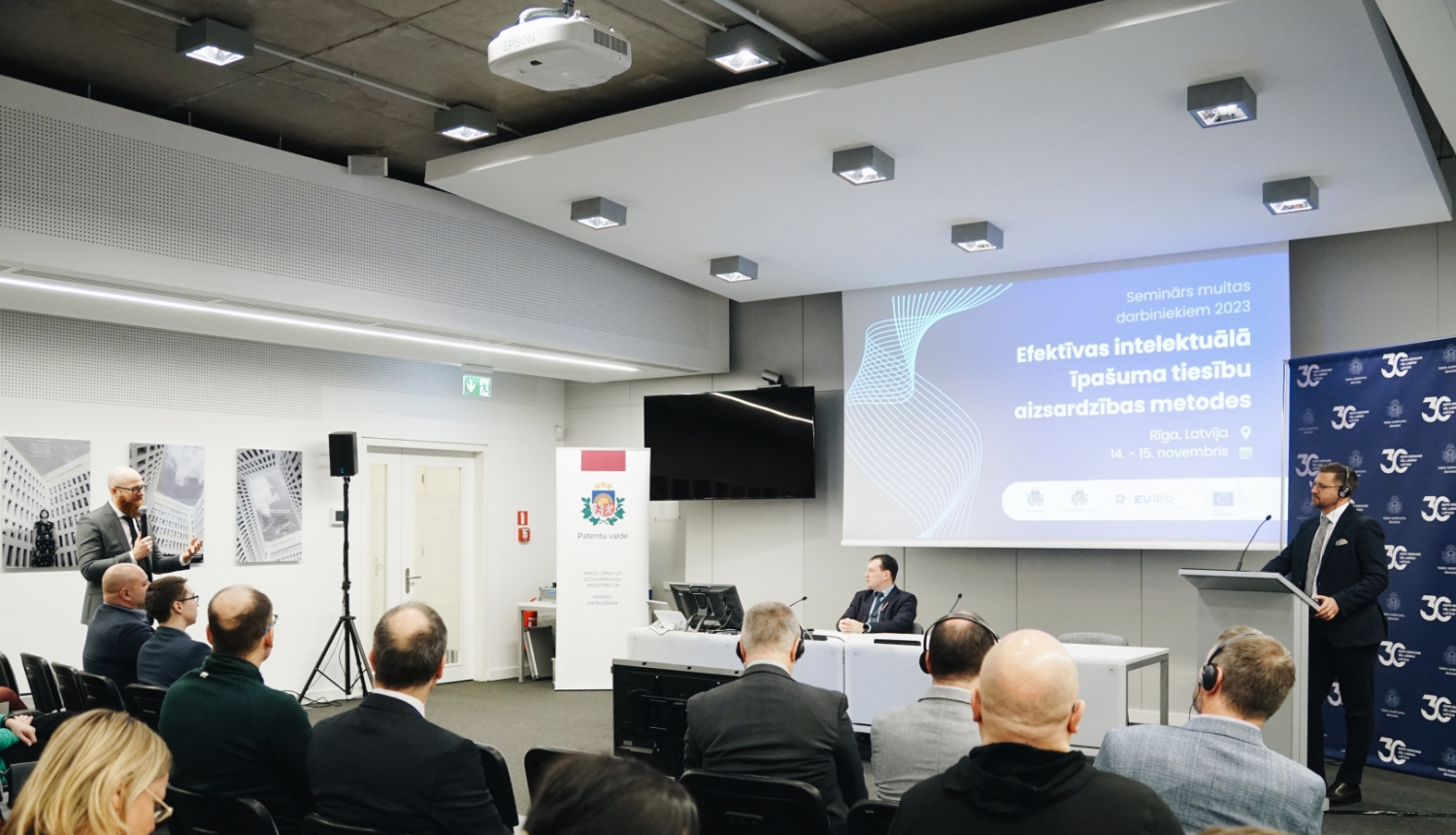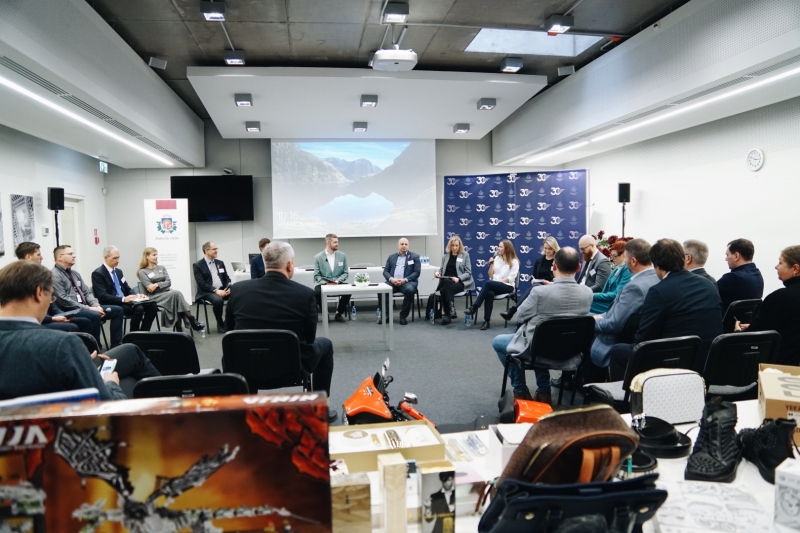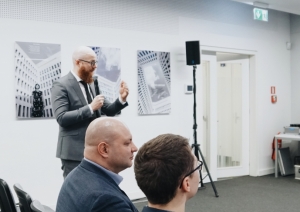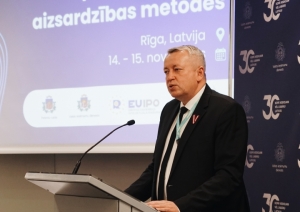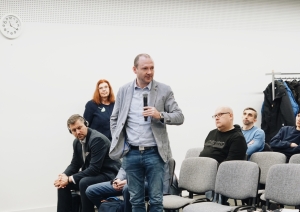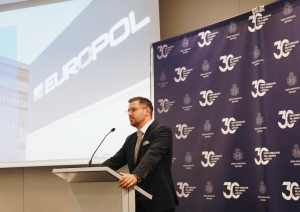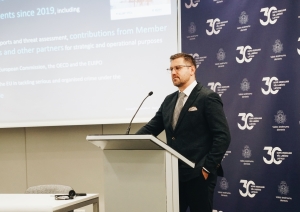Knowledge, awareness, and cooperation are among the most important prerequisites in combating the spread of counterfeit goods both locally and internationally. This opinion was expressed by national and foreign experts involved in the protection and enforcement of intellectual property (IP) rights and the fight against counterfeiting at the annual seminar and discussion entitled "Effective methods of enforcing intellectual property rights 2023" co-organized by the Latvian Patent Office and the Customs Board of the State Revenue Service.
On the first day of the event, 14 November, an international seminar was organized for specialists of law enforcement agencies, where experts from Europol, European customs and intellectual property authorities shared their experience in combating the spread of counterfeit goods in their countries, gave an overview of current trends in this field, and presented concrete examples from their practice. Mr. Gordon Borg (Europol), Mr. Per Holgersson (Swedish Customs), Mr. Ninoslav Babić (Croatian Customs Directorate), and Mr. Jeroen Lescrauwaet (Directorate General for Economic Inspection) gave presentations on topical issues and current problems of IP enforcement in their daily practice.
The international experts were unanimous that cooperation between all involved parties, prompt and accurate exchange of information, as well as continuous updating of knowledge of specialists involved in combating counterfeiting are the main elements of effective fight against counterfeiting. They also stressed the importance of promoting awareness of politicians who are responsible for regulatory acts and decision-making in this field.
In his opening remarks, Director of the Latvian Patent Office Agris Batalauskis stressed that, considering the persistent efforts of manufacturers and distributors of counterfeit goods to hide their identity, each of the parties involved in the fight against counterfeiting has a major role in achieving the common goal - to reduce the spread of counterfeits. The result of this two-day seminar and discussion would be to define the main issues to work on in the future that would serve as the basis for the next five-year development plan in the field of IP protection. If we want to change something, it requires a concrete plan developed by all parties involved.
In his turn, Director of the National Customs Board Raimonds Zukuls noted that this year and also the year before, toys made up the largest share of all counterfeit goods detected by the national customs authorities. Counterfeiters do not care about the safety and health of our children. We will continue to monitor cargoes and shipments, but we need to think together about reducing the public's tolerance for counterfeiting. This is the only way to reduce the scale of this problem. Counterfeits endanger consumers, cause losses to the economy. Furthermore, revenue from the sale of counterfeit goods can be used to finance other criminal activities. The responsible authorities in Latvia and throughout the European Union cooperate to minimize as much as possible the risks and protect the citizens.
Speaking about the trends, Europol’s strategic analyst Gordon Borg emphasized that it is important to work with that part of the public that is not even aware of being involved in the promotion of the business of counterfeiting. Nowadays, consumers’ opinions are greatly influenced by social media and influencers, and it should also be taken into account. Purchasing of fakes supports other criminal organisations’ activities such as drug business, tax evasion, cybercrime, and environmental crime.
The experts from Belgium, Sweden, and Croatia discussed the trends in the spread of counterfeit goods observed in their countries. For example, counterfeits are no longer sold at a much lower price. Traders have realized that the consumer relies on the price – expensive means good. Also, counterfeit products are stored in large quantities in private houses and sold on social media platforms. Another trend is the adaptation of counterfeiters to the tactics of law enforcement agencies and learning from their own mistakes.
At the end of the seminar, the participants listened to the presentations of patent attorneys and representatives of right owners on the ways to identify counterfeit and pirated goods.
The second day of the event, 15 November, was dedicated to the discussion for experts aiming to find out what could be changed, improved, and in which directions to work in order to reduce the spread and import of fakes in Latvia. The experts' opinions will be summarised and used for the preparation of a report on the development of IP protection and management system in Latvia for the next five years.
The experts discussed the issues of defining counterfeiting and its perception by the public, improvement of cooperation with right holders who also play an important role in reducing the spread of counterfeits. Other urgent questions are the effectiveness of the entire system of counterfeit detection, whether the penalties are high enough for IP crimes, and how to reduce the spread of counterfeit products sold by private persons on social media platforms.
The participants of the discussion admitted that it was necessary to find ways to address the public more effectively, raising awareness of the negative impact of counterfeiting on a number of sectors, as well as on people’s health, thinking of addressing specific target audiences in an engaging way. One of the steps would be the development of educational programs for school-age children on the protection and importance of IP, which should be part of educational content. At the same time, it remains important to train law enforcement officers who specialize in counterfeit detection.
When discussing the involvement of right owners in the fight against counterfeiting, the experts admitted that their attitude and activities are different. There are brand owners who actively cooperate, but there are also those who, considering their trading volumes, are not ready to devote their time and financial resources to such infringements. One of the most popular ways for counterfeits to cross the national border is small parcel mail. While a shipment may be of a relatively low value, its examination and destruction is incomparably more expensive. This means financial losses either for the state, i. e. customs agencies, or for right holders.
IP crimes are subject to both criminal and administrative liability. The participants of the discussion had different opinions on whether the penalty measures need to be strengthened, including the liability of private persons buying counterfeits via international trading platforms.
Considering the wide range of topics, the Latvian Patent Office will summarise and analyse the opinions expressed at the discussion and based on that will organize more detailed discussions with the parties involved to jointly search for solutions to the existing problems.



